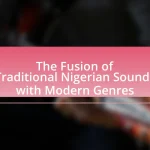King Sunny Adé is a pivotal figure in the evolution of Juju music, renowned for popularizing the genre on a global scale. His innovative integration of traditional Yoruba rhythms with modern instrumentation, particularly in his acclaimed albums like “Synchro System” and “Juju Music,” has significantly broadened the appeal of Juju music beyond Nigeria. Adé’s performances, characterized by vibrant stage presence and elaborate choreography, have further solidified his influence, inspiring generations of musicians and contributing to the recognition of African music worldwide. The article explores his key contributions, cultural impacts, and the legacy he has established in the music industry.

What is the Legacy of King Sunny Adé in Juju Music?
King Sunny Adé’s legacy in Juju music is marked by his role as a transformative figure who popularized the genre globally. He introduced innovative instrumentation and a fusion of traditional Yoruba music with modern elements, which expanded Juju music’s appeal beyond Nigeria. His 1982 album “Synchro System” gained international acclaim, showcasing his unique style and contributing to the global recognition of African music. Adé’s influence is evident in the way he inspired subsequent generations of musicians, blending cultural heritage with contemporary sounds, thus solidifying Juju music’s place in the world music scene.
How did King Sunny Adé influence the development of Juju music?
King Sunny Adé significantly influenced the development of Juju music by modernizing its sound and expanding its audience globally. He incorporated electric instruments, such as the guitar and synthesizers, into traditional Juju music, which enhanced its appeal and allowed for a fusion of various musical styles. His 1982 album “Juju Music” was pivotal, as it introduced the genre to international listeners, showcasing its rhythmic complexity and cultural richness. Adé’s performances, characterized by vibrant stage presence and elaborate choreography, further popularized Juju music beyond Nigeria, establishing it as a prominent genre in world music.
What are the key elements of Juju music that King Sunny Adé popularized?
King Sunny Adé popularized several key elements of Juju music, including the use of electric guitars, synthesizers, and traditional Yoruba rhythms. His incorporation of these instruments created a distinctive sound that blended traditional African music with modern influences, making Juju music more accessible to a global audience. Additionally, Adé emphasized the importance of storytelling through lyrics, often reflecting social and cultural themes relevant to the Yoruba people. His innovative approach and performances helped elevate Juju music’s status, leading to its recognition beyond Nigeria, particularly in the 1980s when he gained international acclaim.
How did his musical style differ from traditional Juju music?
King Sunny Adé’s musical style differed from traditional Juju music primarily through his incorporation of electric instruments and a broader range of musical influences, including funk and rock. While traditional Juju music relied heavily on acoustic instruments like the talking drum and was often performed in a more straightforward rhythmic structure, Adé introduced electric guitars, synthesizers, and complex arrangements, which modernized the sound and expanded its appeal. This evolution is evidenced by his international success in the 1980s, where albums like “JuJu Music” showcased these innovations, blending traditional Yoruba rhythms with contemporary styles, thus redefining the genre and attracting a global audience.
Why is King Sunny Adé considered a pioneer in the music industry?
King Sunny Adé is considered a pioneer in the music industry due to his role in popularizing Juju music on a global scale. He innovated the genre by incorporating various musical elements, such as traditional Yoruba rhythms, Western pop, and rock influences, which broadened its appeal. His 1982 album “Juju Music” was one of the first African albums to gain international recognition, showcasing the genre’s potential and leading to increased interest in African music worldwide. Adé’s use of electric guitars and synthesizers also modernized Juju music, making it more accessible to diverse audiences.
What innovations did he bring to Juju music?
King Sunny Adé introduced several innovations to Juju music, including the incorporation of electric instruments and a more complex rhythmic structure. He was among the first to use electric guitars and synthesizers in Juju music, which modernized the genre and expanded its appeal beyond traditional audiences. Additionally, Adé’s use of intricate percussion patterns and layered vocal harmonies created a richer sound, setting a new standard for musical arrangements in Juju. His pioneering efforts helped elevate Juju music to an international platform, influencing artists globally and contributing to its recognition as a significant genre in world music.
How did his international collaborations shape his legacy?
King Sunny Adé’s international collaborations significantly shaped his legacy by expanding the global reach of Juju music and influencing diverse musical genres. Through partnerships with artists like Stevie Wonder and Paul Simon, Adé introduced traditional Nigerian sounds to a wider audience, blending them with Western musical styles. This fusion not only elevated his status as a pioneer of world music but also contributed to the recognition of African music on the international stage, as evidenced by his performances at major festivals and his Grammy nominations. These collaborations helped establish a cultural bridge, allowing for greater appreciation and understanding of African musical heritage, thus solidifying his impact in the global music landscape.
What are the Cultural Impacts of King Sunny Adé’s Music?
King Sunny Adé’s music has significantly influenced Nigerian culture and the global perception of African music. His incorporation of traditional Yoruba rhythms with modern instrumentation popularized juju music, making it a staple in Nigerian festivities and celebrations. This fusion not only revitalized interest in Yoruba cultural heritage but also facilitated the global spread of African music, as evidenced by his international tours and collaborations with artists across various genres. Adé’s music has also played a role in promoting social issues, addressing themes such as love, politics, and community, thereby fostering a sense of unity and cultural identity among listeners.
How has King Sunny Adé’s music influenced Nigerian culture?
King Sunny Adé’s music has significantly influenced Nigerian culture by popularizing juju music and integrating traditional African rhythms with modern sounds. His innovative approach has led to the global recognition of Nigerian music, showcasing cultural heritage through vibrant performances and lyrical storytelling. Adé’s use of electric guitars and synthesizers in juju music has modernized the genre, making it appealing to younger audiences while preserving its roots. His impact is evident in the way he has inspired a new generation of musicians, contributing to the evolution of Nigerian music and its acceptance on international platforms, such as his performances at major festivals and collaborations with global artists.
What role did his music play in the Nigerian music scene during the 1980s?
King Sunny Adé’s music played a transformative role in the Nigerian music scene during the 1980s by popularizing juju music both locally and internationally. His innovative fusion of traditional Yoruba rhythms with modern instruments and styles attracted a diverse audience, leading to a significant rise in the genre’s popularity. Adé’s albums, such as “Juju Music” released in 1982, showcased this blend and received critical acclaim, helping to establish juju music as a prominent genre in Nigeria and beyond. His performances, characterized by vibrant stage presence and elaborate band arrangements, further solidified his influence, making him a key figure in the global recognition of Nigerian music during that decade.
How did his lyrics reflect social and political issues in Nigeria?
King Sunny Adé’s lyrics reflect social and political issues in Nigeria by addressing themes such as corruption, poverty, and social injustice. His songs often critique government policies and highlight the struggles of the common people, illustrating the socio-economic challenges faced by Nigerians. For instance, in tracks like “Ja Funmi,” he emphasizes the need for social change and empowerment, resonating with the frustrations of his audience during times of political unrest. Adé’s incorporation of traditional Yoruba proverbs and storytelling further enriches his commentary on societal issues, making his music a powerful vehicle for social awareness and political discourse in Nigeria.
What is the significance of King Sunny Adé’s performances?
King Sunny Adé’s performances are significant as they have played a crucial role in popularizing Juju music globally. His innovative blend of traditional Yoruba music with modern instruments and styles has not only elevated the genre but also showcased African culture on international stages. Adé’s performances often feature vibrant visuals, intricate guitar work, and rhythmic percussion, which have captivated audiences worldwide, leading to increased recognition and appreciation of African music. His influence is evident in the way he has inspired numerous artists across various genres, contributing to the global music landscape.
How did his stage presence contribute to his popularity?
King Sunny Adé’s stage presence significantly contributed to his popularity by captivating audiences with his energetic performances and charismatic demeanor. His ability to engage with the crowd through vibrant dance moves, colorful attire, and interactive musical elements created an immersive experience that resonated with fans. This dynamic presence not only showcased his musical talent but also established a strong emotional connection with his audience, leading to increased fan loyalty and widespread acclaim. Adé’s performances often featured a blend of traditional African rhythms and modern influences, further enhancing his appeal and solidifying his status as a pioneer in Juju music.
What unique elements did he incorporate into his live shows?
King Sunny Adé incorporated vibrant visual elements, intricate choreography, and a blend of traditional and modern instrumentation into his live shows. His performances featured elaborate costumes and stage designs that reflected Nigerian culture, enhancing the overall experience. Additionally, he utilized a mix of electric guitars, synthesizers, and traditional Yoruba percussion, creating a unique sound that captivated audiences. These elements not only showcased his musical versatility but also elevated the cultural significance of juju music on a global stage.

What are the Key Achievements of King Sunny Adé?
King Sunny Adé is renowned for popularizing Juju music globally and is credited with bringing Nigerian music to international audiences. His key achievements include releasing over 30 albums, with notable works such as “Synchro System,” which gained significant acclaim and commercial success. Adé’s innovative fusion of traditional African rhythms with modern instruments has influenced numerous artists and genres. He has received multiple awards, including the prestigious Grammy nomination for Best World Music Album in 1999. Additionally, his performances have captivated audiences worldwide, showcasing the rich cultural heritage of Nigeria.
What awards and recognitions has King Sunny Adé received?
King Sunny Adé has received numerous awards and recognitions throughout his career, including the prestigious International Reggae and World Music Award for Best African Artist in 1990. Additionally, he was honored with the title of “African Music Legend” at the 2008 African Music Awards. His contributions to music have also been acknowledged with a Grammy nomination for Best World Music Album in 1999 for “Odu.” These accolades highlight his significant impact on the music industry and his role as a pioneer of Juju music.
How have these accolades contributed to his legacy?
King Sunny Adé’s accolades have significantly solidified his legacy as a pioneer of Juju music. His numerous awards, including the Grammy nominations and international recognition, have not only validated his artistic contributions but also elevated the global perception of Nigerian music. For instance, his 1983 album “Synchro System” received a Grammy nomination, showcasing the fusion of traditional African rhythms with modern sounds, which has inspired countless musicians. These achievements have established him as a cultural ambassador, influencing the global music scene and ensuring that Juju music remains relevant and celebrated worldwide.
What milestones mark his career in the music industry?
King Sunny Adé’s career in the music industry is marked by several significant milestones, including the release of his groundbreaking album “Juju Music” in 1982, which introduced African music to a global audience. This album was pivotal in popularizing juju music outside Nigeria and earned him international acclaim. Additionally, his performance at the 1983 New York City concert, which was part of the “African Music Festival,” showcased his unique style and further solidified his status as a global ambassador for African music. Furthermore, King Sunny Adé’s collaboration with various international artists, including the American musician Stevie Wonder, exemplifies his influence and reach within the music industry. These milestones collectively highlight his role in transforming juju music into a recognized genre worldwide.
How can aspiring musicians learn from King Sunny Adé’s journey?
Aspiring musicians can learn from King Sunny Adé’s journey by studying his innovative approach to blending traditional African music with modern influences, which helped him gain international recognition. Adé’s incorporation of electric instruments and diverse musical styles into Juju music not only modernized the genre but also expanded its audience beyond Nigeria. His success demonstrates the importance of adaptability and creativity in music, as evidenced by his ability to collaborate with various artists and explore different musical landscapes, leading to multiple Grammy nominations. By following his example, aspiring musicians can understand the value of cultural fusion and the significance of evolving their sound to reach broader audiences.
What best practices can be adopted from his approach to music and performance?
King Sunny Adé’s approach to music and performance emphasizes the integration of traditional African rhythms with contemporary sounds, which can be adopted as a best practice in music creation. This fusion not only preserves cultural heritage but also appeals to a broader audience, enhancing the music’s reach and relevance. Additionally, his use of vibrant stage presence and elaborate performances engages audiences, creating a memorable experience that encourages emotional connection. The incorporation of skilled musicianship and collaboration within his band showcases the importance of teamwork in achieving a cohesive sound. These practices have contributed to his success and can serve as a model for aspiring musicians aiming to innovate while honoring their roots.
How can artists maintain cultural authenticity while pursuing global appeal?
Artists can maintain cultural authenticity while pursuing global appeal by integrating traditional elements of their culture into their work while adapting to global trends. For instance, King Sunny Adé successfully blended traditional Yoruba music with contemporary sounds, allowing him to reach international audiences without losing his cultural roots. This approach not only preserves the essence of the original music but also makes it accessible and appealing to a broader audience, as evidenced by his global recognition and influence in the music industry.













